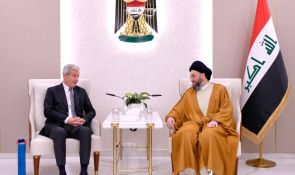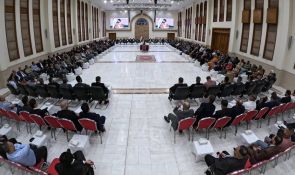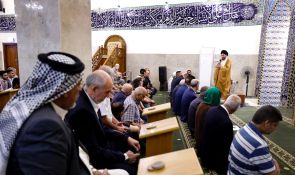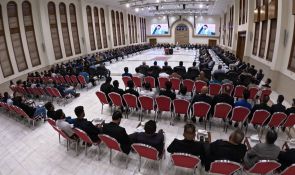DURING THE 8TH RAMADAN EVENING AT THE OFFICE OF HIS HOLINESS SAYYID AMMAR AL-HAKIM: “Woman’s hijab is a psychological factor, a state of virtue and dignity.”
Sayyid Ammar al-Hakim, Head of the Islamic Supreme Council of Iraq (ISCI), pointed out that vision’s right on man is that one should keep his eyes away from what is not lawful for him, abandoning its abuse. He explained that one look may push one to fall into many transgressions and sins.
In his talk during the eighth Ramadan evening at the Baghdad office of His Holiness on Saturday, July 28, 2012, His Holiness stressed the need not to give the eyes what they seek in a way which distracts one from the remembrance of Allah, drawing attention in this regard to the Messenger of Allah (Õ) saying that casting a look is like shooting one of Satan’s poisoned arrows. One who stops doing so for fear of Allah, He will grant him a conviction the sweetness of which he finds in his heart.
His Holiness also pointed out to hijab (veil) being a psychological factor and a state of virtue and dignity, stressing the necessity of turning such psychological factor and immunities into an ethical status inside the women, warning against falling into adultery and the committing of what is prohibitive. He produced evidence by citing the Messenger of Allah (Õ) saying, “Each part of a son of Adam has a share in adultery.” His Holiness explained that the adultery of the eye is a (prohibitive) look, the adultery of the tongue is speech, the adultery of the ears is hearing, the adultery of the hands is oppressing and the adultery of the feet is walking.
His Holiness called on married couples to build an integrated human relationship in its rights and obligations, explaining that the role bears part of the responsibility for safeguarding her husband. Likewise, the husband bears an important portion of the responsibility for safeguarding his wife. He warned against thievery saying, “Being a thief is not just taking or stealing something from the house; rather, thievery means that you violate the honor of this house.”










